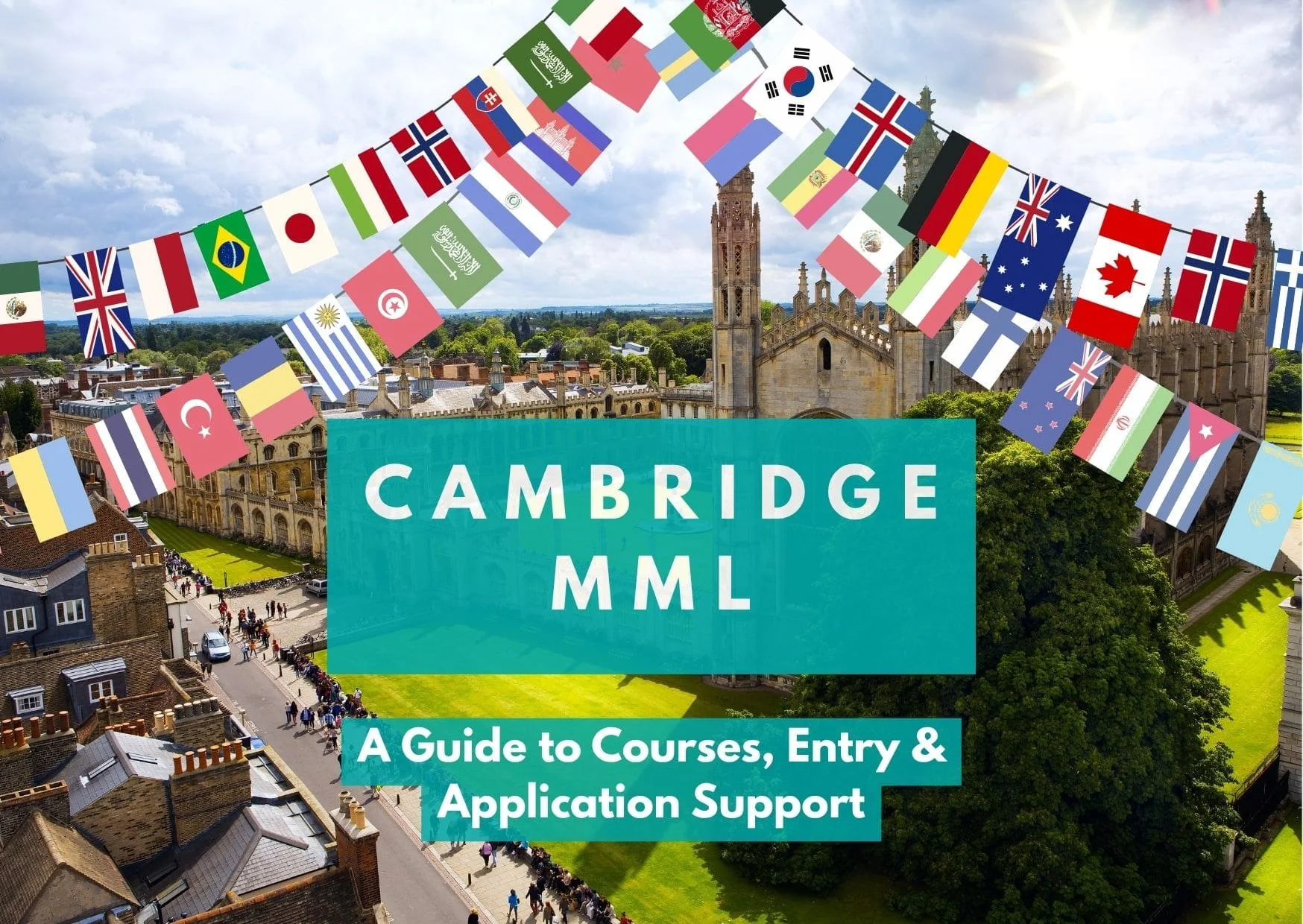Cambridge MML: A Guide to Courses, Entry & Application Support
Why Choose MML at Cambridge?
The QS World Rankings 2025 placed Cambridge 1st in the world for Modern Languages. It’s easy to see why they earned this ranking when considering the breadth of the Modern and Medieval Languages (MML) degree and the state-of-the-art facilities that Cambridge Language students can use.
The Cambridge MML course is unique because it enables students to pursue a broad range of language interests, both by language and period.
Language fluency is developed by studying your chosen language through speaking, reading texts, listening to audio, and watching video media.
As well as developing your language skills, you’ll have the opportunity to explore literature, thought, film, art, history, and the linguistics of your chosen languages.
Unlike at Oxford, Cambridge MML students prepare a project on their year abroad that counts as 1/6th of their final degree. This could be a dissertation, translation, or linguistics project. They also take an oral exam once back in Cambridge.
In your fourth year, you can also take up to two options from other courses, such as English or History, combine options from two or more languages, study comparative options, and more.
Combining the study of languages includes papers such as ‘European film’ and ‘Linguistics of the German, Romance, and Slavonic Language Families.’
It is also easier to change your language choices than at Oxford, where you apply for the language you want to study outright. At Cambridge, you can indicate which languages you’re interested in learning, but you can change this before or after you start the course.
MML has significant career value and is great for employability!
Alongside language fluency and cultural appreciation, you develop a range of other transferable skills employers value, such as analysis, research, critical thinking, and more.
Graduates have gone on to various destinations, including international law firms, charity work, BBC World Service, and much more.
Some go on to further study and become translators, language teachers, and linguists.
What Languages Can You Study in Cambridge MML?
The MML course is available for study at all colleges.
Languages available:
All students study two of:
French (if you’re taking it at A-Level)
German
Italian
Portuguese
Russian
Spanish.
Or students can take one of those with either Classical Latin or Classical Greek, regardless of having studied this at A-Level.
In the second or fourth years, students can sometimes take an introductory course in a language and culture they’ve never previously studied. For instance:
Catalan
Modern Greek
Polish
Portuguese
Ukrainian
Linguistics and joint options
Linguistics - Cambridge, unlike Oxford, offers students the opportunity to study Linguistics on its own, without the study of a specific language.
Asian and Middle Eastern Studies Course - This course Enables students to study one modern European language with Arabic, Hebrew, or Persian.
History and Modern Languages - Students choose to study a language alongside History.
Uncertain which is the best option for you? We offer mentoring on courses, universities, and college choices as part of our tuition. Learn more here.
Cambridge MML Entry Requirements FAQs
Can you get in with AAA?
No, the minimum offer at A-Level is A*AA. Most colleges may ask for higher grades or set an A* for a particular subject. Most MML students (71%) who began in 2018, 2019, and 2023 achieved at least A*A*A.
Is it hard to get in? Which MML course is most competitive?
It isn’t as competitive as other courses, such as Linguistics, which receives three applications per place. However, there are still two applicants for every place, so it is not easy either.
How many students are accepted each year?
117 applications were successful in 2024.
Is there an assessment?
Yes, all colleges have an admission assessment.
There are two elements to the assessment:
Discursive Response in a Foreign Language (40 mins)
Discursive Response in English (20 mins)
Those who wish to study a modern language with Classical Latin or Greek (who have studied them before) will also have their classical language assessed. This is done through a skills assessment interview, which lasts 20 minutes.
See this webpage for specific dates and requirements.
Check out our Cambridge MML Admissions Test Guide for more guidance.
Do you need to submit work?
Yes, you must submit two pieces of school work. One piece must be in the languages you intend to study at University.
How many points do I need for IB?
41-42 points, with 776 at HL. Most students who began the MML course in 2018, 2019, and 2023 achieved at least 43 points.
Do I need to have read the languages I want to study at A-Level?
Before attending Cambridge, you must have studied at least one of the languages you want to read. Ideally, this will have been at A-Level. The only A-Level required is French, should you wish to study it.
Which subjects help make a strong application?
Ideally, two languages. 60% of students who began MML courses in 2018, 2019, and 2023 took two languages. English, History, and Maths are other recommended subjects.
Got other admissions questions we haven’t answered? Book a free 20-minute Cambridge MML consultation to learn more about the course and how our Oxbridge-educated tutors can help your application stand out!
Personal Statement Tips for MML
The Personal Statement is your first chance to tell admissions tutors why you want to study languages. What is it about them that makes you tick? Do you have a niche language interest? Why languages and not something else?
Check out this article about Applying for Linguistics at University, written by one of our expert language admissions tutors, Rhys.
He studied Spanish and Linguistics at Oxford, but offers excellent advice on what makes a language’s personal statement stand out, including providing a reading list to get you started.
Don’t just read books, try podcasts, online lectures, and other resources.
Start with something broad, perhaps an overview of significant French works, then hone your research by looking into what interests you.
Niche interests are the way to go!
The importance of using your personal statement to showcase your passion for languages cannot be overstated.
Beyond the curriculum, subject exploration is key to this. Whether this consists of reading, watching films in a foreign language, attending a language club, or more, these are all great places to start.
Recommended Reading and Extracurriculars
Check out our articles that offer tailored personal statement guidance for French, German, and Spanish Oxbridge applicants.
Our co-curricular division, Minds Underground, offers several exciting language extracurricular opportunities, all of which expose students to studying languages at university-level and provide personal statement content:
Each summer, we run an online Modern Foreign Languages Summer School which offers broader cross-language linguistics sessions and Spanish, German, and French subject-specific sessions.
We also offer a Languages Essay Competition and Languages Research Projects. These opportunities enable students to develop the research and critical analysis skills needed for Oxbridge language degrees.
Contact us to learn more about our Minds Underground extracurricular offerings.
The MML Interview Process
Most applicants have at least two interviews, usually 20 minutes each. One in each language, or for History and Modern Languages, one interview in the language and one in History.
Remember, the interviewers aren’t trying to catch you out! They want to learn more about your thoughts, current language capabilities, passion for languages, and potential to succeed in the Cambridge supervision system.
At-interview Assessments and Interview Format
You may be given a passage to read before your interview, which you’ll discuss during it.
Discussion typically begins with the personal statement, to learn more about your passion and reasons for studying a particular language.
Supervisions involve learning through discussion and being open to new or challenging ideas. Interviews are, in many ways, like a supervision.
So, be willing to appreciate alternative viewpoints or conclusions to ones you’ve taken in your work or independent subject exploration.
If you've studied it before, there will be some discussion in the language you’re applying for.
The discussion may be around the passage they gave you to read ahead of the interview. There may be questions about translation, style, or content.
Tutors are familiar with the level of post-A-Level language students and won’t intentionally bring up unfamiliar vocabulary.
Ensure you have a strong understanding of grammar and the basics of your language that you have learnt at school.
Importantly, have a go! They want you to demonstrate how you think, are willing to try, and are open to tackling the unfamiliar.
Real Questions & Tips From Recent Applicants
The articles linked in the MML personal statement tips section above also contain interview guidance, including advice on preparation and some past questions.
There are no prescribed interview questions, so don’t be surprised if one that other people have had is not one that you are asked.
Part of the interview is about why you love languages, so expect questions around this. For instance, ‘What about Spanish makes you want to study it at University?’.
There may be broader, more philosophical questions, such as ‘What parts of language are lost through translation?’. These encourage critical engagement and observations about language as a whole.
Oftentimes, questions stem from interesting points you may have raised, or a book you mention, rather than a list of questions tutors feel they must cover.
For a bank of questions to brainstorm and other helpful interview advice, consider our Oxbridge Modern Foreign Languages Interview Pack.
We also run Oxbridge Mock Interview Days in November, which help familiarise students with what to expect on the day and get them used to answering unseen questions.
Looking for one-to-one interview or application support. Get in touch!
Cambridge’s Language Resources & Faculty Insights
Faculty and Facilities
The language faculty is large, representing a diverse range of staff interests. There are six different sections to the faculty.
In addition to the University Library, one of the world’s oldest, Cambridge has an impressively stocked Languages faculty library.
There is also a state-of-the-art CALL facility, which stands for Computer-Assisted Language Learning.
The University Language Centre
Provides bespoke teaching and learning materials
Here, students can take one-year basic Arabic and Mandarin courses and introductory, intermediate, and advanced courses in several modern European languages. These courses count as a further language qualification.
Course Insights
Even without studying the linguistics course, MML students can still take linguistics papers, such as the cognitive dimensions of Spanish.
In your third year, you spend at least 8 months on a ‘Year abroad’ in one or two countries. This can be attending a foreign university, being an English language assistant at a school, or completing an internship.
Teaching is varied but consists of supervisions, lectures, seminars, language classes, oral work and more. You have around 12-14 contact hours a week in your first year, far greater than many other subjects.
As teaching is varied, so are examinations, with written and oral exams and submitted work consisting of extended translation, research projects, or a dissertation.
Our tutors, with personal experience of the course, use their insights to help you inform your decision about the right course for you and your application. Let them use their expertise to help you make a successful application. Contact us here!
How U2 Tuition Supports Cambridge MML Applicants
At U2 Tuition, we’ve spent nearly a decade helping students secure places at Cambridge for MML.
With our Oxbridge mentoring, you’re guaranteed expert tutors who graduated from your university, in your course, and potentially even your college of choice.
We offer tailored, one-to-one support through every stage of the application process. This includes:
Helping you choose your post-16 subjects ensures you meet the application requirements and stand in good stead for a strong MML application.
Aiding you in making course, university, and college choices, for instance, deciding between linguistics and MML, Oxford and Cambridge, or the tradition of King’s and the modernism of Robinson.
Providing advice in crafting your personal statement from initial research to drafting and reviewing.
Our co-curricular division, Minds Underground, has bountiful extracurricular language opportunities that prove vital content for personal statement and interview discussions.
Advice on which of your submitted work.
Providing admissions test tutoring, covering content and exam technique, and providing in-depth feedback.
Carrying out mock interviews with real-time feedback.
Expert A-level tuition to ensure you meet the conditions of your offer.
Whether you’re in the early stages of considering MML or finalising your UCAS application, we’ll build a bespoke plan around your goals, timeline, and learning style.
Arrange a complimentary MML consultation with U2 Tuition to explore how we can make your application process both enjoyable and successful.





